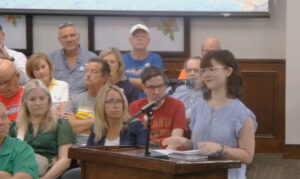Haddix, Imker present dueling spreadsheets; Imker OK with higher taxes, Haddix for ‘plan’
Both Mayor Don Haddix and Councilman Eric Imker agree: Over the next five to 10 years, Peachtree City needs a lot of money it does not currently have to fix aging streets and cart paths — more than $14.6 million, a figure that would consume about half the current city budget if expended at once.
And both seem to agree that the quickest and maybe the cheapest way to get that kind of money is for county and city voters to approve a one-cent special local option sales tax this coming November. Approval would mean the city would collect nearly $15 million within two years, at which time the SPLOST would end.
But Haddix and Imker have diverging views on budget priorities for coming years, including how much taxation city residents should expect.
“We have a spending problem,” Haddix told the council earlier this month. And he has a solution to that: “Create a comprehensive strategic plan for services, income and spending. Currently, expenses are parsed, not viewed in totality. That approach must end. Citizens pay all these costs out of their singular pockets.”
Imker scoffed at the idea. “Maybe you want a general obligation bond of $40 million [to pay for the city’s infrastructure needs], or maybe you want to cut city services by $40 million. We want to hear specifics of what you want to cut. Yes, we are using reserves, but we need answers, not generalizations. … Taxes are going up, up, up, but city [residents] are getting the value of living in Peachtree City.”
It’s the “up, up, up” part that Haddix criticized. “The budget includes projected increases in home values of 2 percent per year beginning in 2014. There is no rollback on the millage rate, meaning your tax bill will increase.
“In 2018 we are still spending more than we bring in, still consuming the reserve every year,” Haddix said. And that doesn’t count the coming costs of stormwater maintenance projects.
“On stormwater, line items from the budget were transferred to stormwater and the fee was over doubled,” Haddix said. “In about three years, we will be looking for new funding for stormwater as well, meaning another fee increase.”
About streets and paths, Haddix said, “We have no funding source for the paths. The SPLOST is being promoted as a short-term, five-year income source, costing you about $400 total, about $80 per year.”
Both Imker and Councilwoman Kim Learnard repeated the questions they have asked of Haddix for several meetings, “Where do we get the money? Where do we cut?”
Haddix’s reply: “Using already existing One Peachtree City and Needs Assessment Survey plus Townhall data gathered early next year, create a comprehensive strategic plan for services, income and spending. Look for places where the city is competing with the commercial sector. We do not need to be in competition with our own businesses. Look for public/private opportunities. I proved with the Tennis Center they work when done correctly. Bring our services in line with what the citizens want. As warranted, re-purpose to new uses.”
Haddix is suggesting — but not spelling out — that the city budget could stand some cutting in areas that he steadfastly refuses to delineate. His suggestion is that such cuts could fund the $1.5 million a year needed for a long-term road and cart path repair program.
Haddix and Learnard are running for reelection this November. Imker has two years left on his term.
Imker presented a spreadsheet that began with the penny sales tax increase heading the list, later calling the SPLOST “a very attractive option.”
His calculations indicated the SPLOST produced more revenue for the city at lower costs than the alternatives of floating a general obligation bond or a city tax millage rate increase.
His chart included the option of cutting undesignated city services as a long-term permanent solution, but noted, “Politicians will have to detail cuts/savings totaling $1.5 million per year” for at least 10 years.
Haddix in his charts showed a long list of city streets and cart paths with a rating ranging from 49 up to 100, with 100 being the pavement in the best condition.
He complained that even the $14.6 million expected from a successful SPLOST would be well short of what the city needs to bring and keep its streets up above a rating of 80.
Councilman George Dienhart called the SPLOST “a temporary bridge to an increased tax digest. It’s two years of pain for 10 years of gain.” Dienhart also is running for the post of mayor this fall.
All Fayette County voters will get to decide the fate of the extra penny sales tax on most purchases at the ballot box Nov. 5.
Worst and best PTC streets
The 10 worst streets in Peachtree City by paving condition:
1. Crosstown Drive, Peachtree Parkway to Ga. Highway 74 — rated 49
2. Southworth Court — rated 55
3. Commerce Drive West Park to Aberdeen Drive — rated 58
4. Crosstown Drive, Peachtree Parkway to Robinson Road — rated 59
5. Line Creek Drive — rated 59
6. Rolling Green — rated 60
7. Westpark Drive — rated 60
8. Adell Court — 61
9. Holly Grove Church Road — rated 62
10. Pinemount Drive — rated 62
Streets in PTC rated 100 in paving condition
1. Clover Reach, Clover Green to Ga. Highway 74
2. Hilltop Drive (west)
3. Loblolly Circle
4. Wisdom Road
5. Morallion Hills
6. Southwick Lane
7. White Hall Close











Leave a Comment
You must be logged in to post a comment.